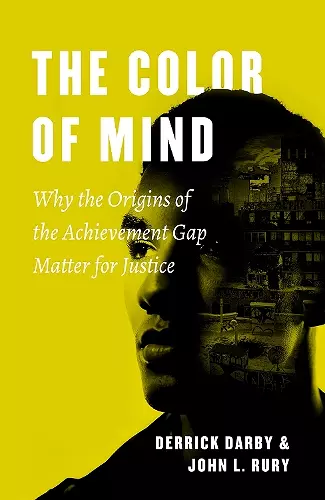The Color of Mind
Why the Origins of the Achievement Gap Matter for Justice
John L Rury author Derrick Darby author
Format:Paperback
Publisher:The University of Chicago Press
Published:24th Jan '18
Should be back in stock very soon

American students vary in educational achievement, but white students in general typically have better test scores and grades than black students. Why is this the case, and what can school leaders do about it? In The Color of Mind, Derrick Darby and John L. Rury answer these pressing questions and show that we cannot make further progress in closing the achievement gap until we understand its racist origins. Telling the story of what they call the Color of Mind--the idea that there are racial differences in intelligence, character, and behavior--they show how philosophers such as David Hume and Immanuel Kant, and American statesman Thomas Jefferson, contributed to the construction of this pernicious idea, how it influenced the nature of schooling and student achievement, and how voices of dissent such as Frederick Douglass, Frances Ellen Watkins Harper, and W. E. B. Du Bois debunked the Color of Mind and worked to undo its adverse impacts. Rejecting the view that racial differences in educational achievement are a product of innate or cultural differences, Darby and Rury uncover the historical interplay between ideas about race and American schooling, to show clearly that the racial achievement gap has been socially and institutionally constructed. School leaders striving to bring justice and dignity to American schools today must work to root out the systemic manifestations of these ideas within schools, while still doing what they can to mitigate the negative effects of poverty, segregation, inequality, and other external factors that adversely affect student achievement. While we cannot expect schools alone to solve these vexing social problems, we must demand that they address the dignitary injustices associated with how we track, discipline, and deal with special education that reinforce long-standing racist ideas. That is the only way to expel the Color of Mind from schools, close the racial achievement gap, and afford all children the dignity they deserve.
"'A mind is a terrible thing to waste'--but if the minds in question are black, then from the perspective of white racist educational policies, there's really nothing much to lose to begin with. In this powerful indictment of the long history of discriminatory practices in U.S. schools, Derrick Darby and John L. Rury demonstrate how traditional racist assumptions about the 'color of mind' have systematically denied black students equal dignity and respect, and created the longstanding racial achievement gap in education. They demand corrective educational justice--a demand every decent American should support."--Charles W. Mills, Graduate Center, City University of New York "The Color of Mind insists that no educational reform can succeed without teachers and school leaders knowing that black children were never supposed to learn or achieve by the same standards of their white counterparts. This pernicious idea and practice is at the root of today's black-white achievement gap. Knowing this history is the first and most consequential step towards ensuring that every school respects the dignity of black lives and black minds. Then comes the obvious, as this brilliant work shows: dismantling every policy of racially disparate tracking, disciplining or special education if real justice is ever to be achieved."--Khalil Gibran Muhammad, author of The Condemnation of Blackness: Race, Crime, and the Making of Modern Urban America "The Color of Mind is timely intervention into debates and discourses about the relationship between race, justice, and American education. From philosophy it offers a useful genealogy of the ethics of white supremacy and its impact on mutual racial respect; from history it offers a lean and direct account of the development of not only education policy but also the background conditions that preempted certain policies while making others possible. The authors have done a remarkable thing - they have made the hard work or pairing conceptual and historical work on an issue and topic that has been at the center of American debates for more than a century look easy and effortless to read."--Christopher J. Lebron, Johns Hopkins University "'Achievement gap'--the phrase seems as normal or natural as anything we know about education. However, The Color of Mind meticulously documents the historical, social, political, and cultural context in which disparity was manufactured and is currently maintained. Everyone who cares about educational inequality should read this book."--Gloria J. Ladson-Billings, University of Wisconsin
ISBN: 9780226525358
Dimensions: unknown
Weight: unknown
224 pages